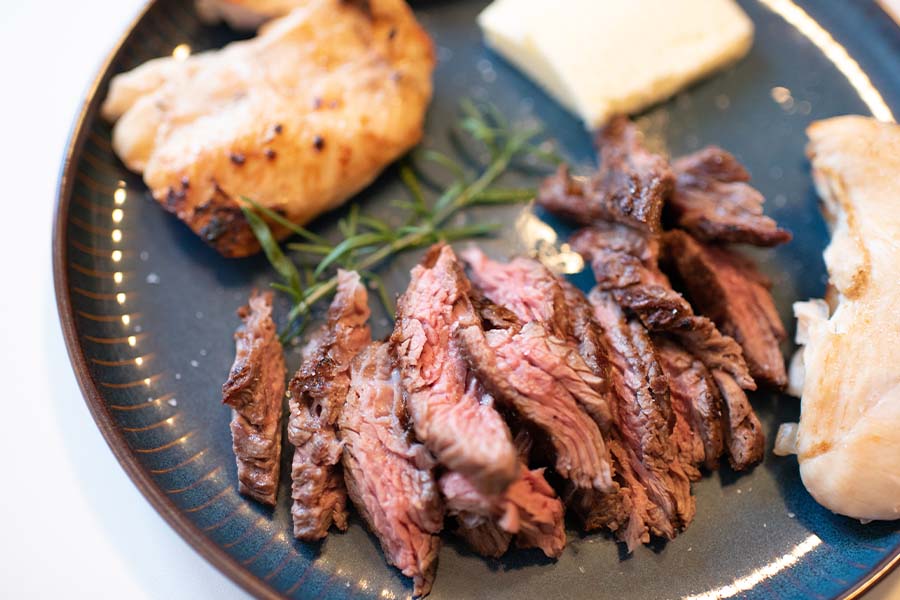The Carnivore Diet is a high-fat, low-carbohydrate, and low-fiber diet primarily consisting of animal products such as meat, fish, and dairy.
The diet is a modern adaptation of the Paleolithic diet based on the idea that humans evolved to eat a diet similar to our hunter-gatherer ancestors. The Carnivore Diet has gained popularity in recent years among those looking for an alternative to the traditional Western diet.
The idea of a meat-based diet has been around for centuries. Still, as it is known today, the Carnivore Diet was popularized in the early 2000s by Dr. Shawn Baker, a former orthopedic surgeon, and world-record-holding athlete. Baker claims that the Carnivore Diet has helped him improve his athletic performance and overall health.
We will provide a detailed overview of the Carnivore Diet, including its benefits, risks, and how to plan a balanced meal plan. Whether you're considering trying the Carnivore Diet for health reasons or out of curiosity, this article aims to equip you with all the necessary information to begin your journey on the Carnivore Diet.
So, let's get started!
The Science Behind the Carnivore Diet
The Carnivore Diet is based on the idea that humans are adapted to a diet that consists mainly of animal products. The body is forced to rely on fat for energy instead of carbohydrates by consuming a high-fat, low-carbohydrate, and low-fiber diet. This process, known as ketosis, can result in improved metabolic health and weight loss.
While there is limited scientific research on the Carnivore Diet, some studies have shown that low-carbohydrate diets can effectively lose weight and improve metabolic health markers such as blood glucose and cholesterol levels. Additionally, anecdotal Evidence suggests that the Carnivore Diet may help with autoimmune disorders, gastrointestinal issues, and other chronic health conditions.
Proponents of the Carnivore Diet claim it can lead to weight loss, improved energy levels, and better mental clarity. Some also suggest that it can help with conditions such as arthritis, depression, and diabetes.
However, the long-term effects of diet on overall health are not well understood. Potential risks of the Carnivore Diet include nutrient deficiencies, particularly in fiber, vitamins, and minerals, and an increased risk of heart disease and other chronic health conditions associated with a high-fat diet. Therefore, consult your healthcare professional before starting a diet plan.
Related Article: What Happens When You Are Fasting? The Science and Benefits of Fasting
Health Benefits of the Carnivore Diet
The Carnivore Diet has gained popularity in recent years due to its reported health benefits. While scientific research on the diet is limited, some studies and anecdotal evidence suggest that it may have several potential health benefits. Here are some of the reported health benefits of the Carnivore Diet:
Weight Loss
The Carnivore Diet is a high-protein, low-carbohydrate diet that may lead to weight loss since it has the ability to reduce hunger and promote satiety. The high protein intake may also help preserve muscle mass and promote fat loss. You can also supplement with a fat burner to burn fat.
Improved Digestion
Improved digestion is among the potential benefit of this diet. It's because when you follow the Carnivore Diet, you automatically eliminate processed foods, grains, and high-carbohydrate vegetables that may be difficult to digest. The high-fat content of the diet may also stimulate the production of bile and digestive enzymes, leading to better digestion.
Reduced Inflammation
The Carnivore Diet may help reduce inflammation in the body, which is linked to several chronic diseases. Some studies have shown that a low-carbohydrate diet can lower markers of inflammation in the body.
Potential for Improved Mental Health
Carnivore Diet may help improve symptoms of depression, anxiety, and other mental health conditions. This may be due to eliminating foods such as sugar and processed foods that can cause inflammation and affect brain function.
Related Article: How to Lose Weight Naturally?
Planning a Carnivore Diet Meal Plan
The Carnivore Diet is a restrictive diet primarily consisting of animal products such as meat, fish, and dairy. This means that processed foods, grains, and high-carbohydrate vegetables such as potatoes and corn are prohibited.
While the diet may seem limited, there are still plenty of options for protein and fat sources that can be incorporated into meals. To ensure that you are getting a range of nutrients, it is important to include various animal products in your meals.
Some options for protein sources include beef, chicken, fish, and eggs, while fat sources include butter, cheese, and oils. These protein and fat sources are essential for providing the body with energy and supporting various bodily functions. You can also supplement with Whey Protein Powder to ensure you are getting enough protein.
While the Carnivore Diet restricts carbohydrates, it still allows for small amounts of low-carbohydrate vegetables such as lettuce, spinach, and broccoli. These vegetables can provide essential vitamins and minerals that the body needs to function properly.
Adding low-carbohydrate vegetables to your meals can also help ensure that you are getting enough fiber, which is important for digestive health. Meal prepping can be a helpful strategy for following the Carnivore Diet.
By cooking large batches of meat or fish, you can easily incorporate them into meals throughout the week. Pre-chopping low-carbohydrate vegetables can also save time and make meal preparation easier.
Additionally, having snacks such as hard-boiled eggs or beef jerky on hand can help you stay on track with the diet while on the go.
Sample Carnivore Diet Meal Plan
Embarking on a new diet can be daunting, but with careful planning and preparation, following a Carnivore Diet meal plan can be a sustainable and enjoyable way of eating. Many people who have adopted the Carnivore Diet have reported improvements in their energy levels, weight loss, and overall health.
The key to successfully sticking to the Carnivore Diet is to plan ahead and have nutritious, satisfying meals and snacks readily available. It may require some extra time in the kitchen for meal prepping, but the benefits are well worth it.
We have provided some sample meal ideas for breakfast, lunch, dinner, and snacks to make the transition to the Carnivore Diet easier. These meals are easy to prepare and incorporate various animal products to ensure you get a range of nutrients.
Breakfast Ideas
- Scrambled eggs with bacon and avocado (509 calories, 25 g protein, 1 g carbs, 45 g fat)
- Steak and eggs with sauteed spinach (603 calories, 50 g protein, 4 g carbs, 43 g fat)
- Smoked salmon with cream cheese and cucumber (411 calories, 20 g protein, 4 g carbs, 35 g fat)
Lunch Ideas
- Grilled chicken breast with mixed greens and olive oil dressing (507 calories, 45 g protein, 3 g carbs, 35 g fat)
- Tuna salad with mayonnaise and celery (394 calories, 30 g protein, 1 g carbs, 30 g fat)
- Beef burger with lettuce wrap and cheese (614 calories, 40 g protein, 1 g carbs, 50 g fat)
Dinner Ideas
- Grilled salmon with roasted asparagus (584 calories, 50 g protein, 6 g carbs, 40 g fat)
- Ribeye steak with sauteed mushrooms and garlic butter (796 calories, 60 g protein, 4 g carbs, 60 g fat)
- Pork chops with roasted cauliflower (703 calories, 45 g protein, 7 g carbs, 55 g fat)
Snack Options
- Beef jerky (100 calories, 15 g protein, 1 g carbs, 4 g fat)
- Hard-boiled eggs (142 calories, 12 g protein, 1 g carbs, 10 g fat)
- Cheese slices (96 calories, 6 g protein, 0 g carbs, 8 g fat)
It's important to note that the macros provided above are only estimates and may vary depending on the specific ingredients and portion sizes used in each meal. Additionally, daily macros may vary depending on your individual nutritional needs and goals.
By incorporating these sample meal ideas into your Carnivore Diet meal plan and experimenting with different ingredients and preparation methods, you can create a satisfying and sustainable way of eating that works for you.
FAQs
1. Is the Carnivore Diet safe?
While more research is needed, there is currently no evidence to suggest that the Carnivore Diet is inherently unsafe for healthy individuals.
However, diet is very restrictive and may not provide all of the necessary nutrients for optimal health. Consulting with a healthcare professional before starting the Carnivore Diet is recommended.
2. Can you get enough nutrients on the Carnivore Diet?
The Carnivore Diet primarily consists of animal products, which can provide a range of essential nutrients, including protein, vitamins, and minerals.
However, it is important to consume a variety of animal products to ensure that all necessary nutrients are being obtained. Incorporating low-carbohydrate vegetables can also help provide additional vitamins and minerals.
3. Can you follow the Carnivore Diet if you have certain health conditions?
The Carnivore Diet may not be suitable for everyone, particularly those with certain health conditions. People with kidney disease, for example, may need to limit their protein intake and should consult with a healthcare professional before starting the Carnivore Diet.
Additionally, people with certain gastrointestinal conditions may find the high-fat content of the diet difficult to tolerate.
4. Is the Carnivore Diet sustainable in the long term?
The long-term sustainability of the Carnivore Diet is not fully understood, and more research is needed to determine its potential effects on health over time. However, with careful planning and attention to nutrient intake, some people may find that the Carnivore Diet is a sustainable way of eating for them.
5. What Are some potential side effects of the Carnivore Diet?
Common side effects of the Carnivore Diet can include constipation, diarrhea, and bad breath. It is important to drink plenty of water and incorporate low-carbohydrate vegetables to help prevent these side effects.
Additionally, some people may experience changes in their cholesterol levels, which should be monitored closely by a healthcare professional.
The Bottom Line
The Carnivore Diet is a high-protein, low-carbohydrate diet primarily consisting of animal products such as meat, fish, and dairy.
While scientific research on the diet is limited, it has gained popularity recently due to reported health benefits, including weight loss, improved digestion, reduced inflammation, and the potential for improved mental health.
Following a Carnivore Diet meal plan can be challenging, but proper planning and preparation can be a sustainable way of eating. However, it is important to consult with a healthcare professional before starting any new diet, particularly one that restricts certain food groups.
With careful consideration and a balanced approach, the Carnivore Diet may be a viable option for those seeking to improve their overall health and wellness.
Reading List
Article Sources
- Harvey, Cliff J. d C., et al. "Low-Carbohydrate Diets Differing in Carbohydrate Restriction Improve Cardiometabolic and Anthropometric Markers in Healthy Adults: A Randomised Clinical Trial." PeerJ, vol. 7, Feb. 2019, p. e6273. peerj.com, https://doi.org/10.7717/peerj.6273.
- Peairs, Abigail T., and Janet W. Rankin. "Inflammatory Response to a High-Fat, Low-Carbohydrate Weight Loss Diet: Effect of Antioxidants." Obesity, vol. 16, no. 7, July 2008, pp. 1573-78. DOI.org (Crossref), https://doi.org/10.1038/oby.2008.252.












